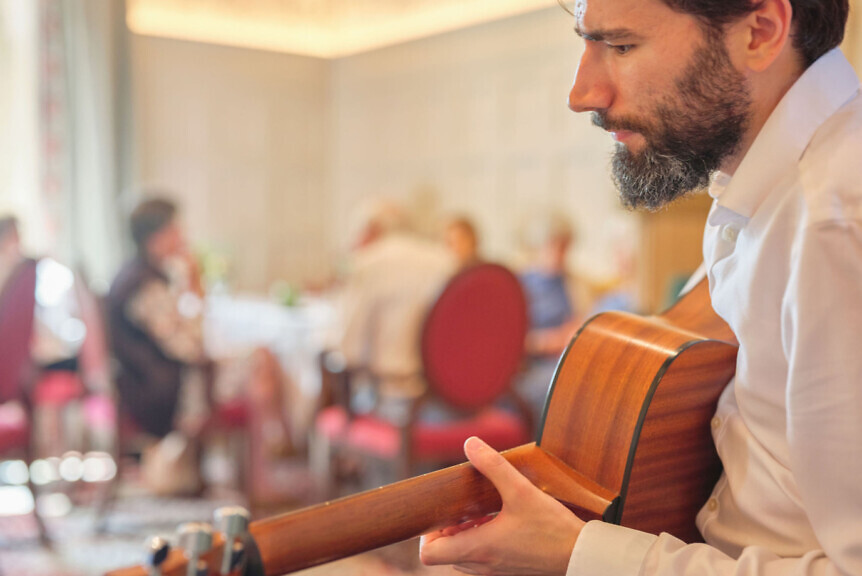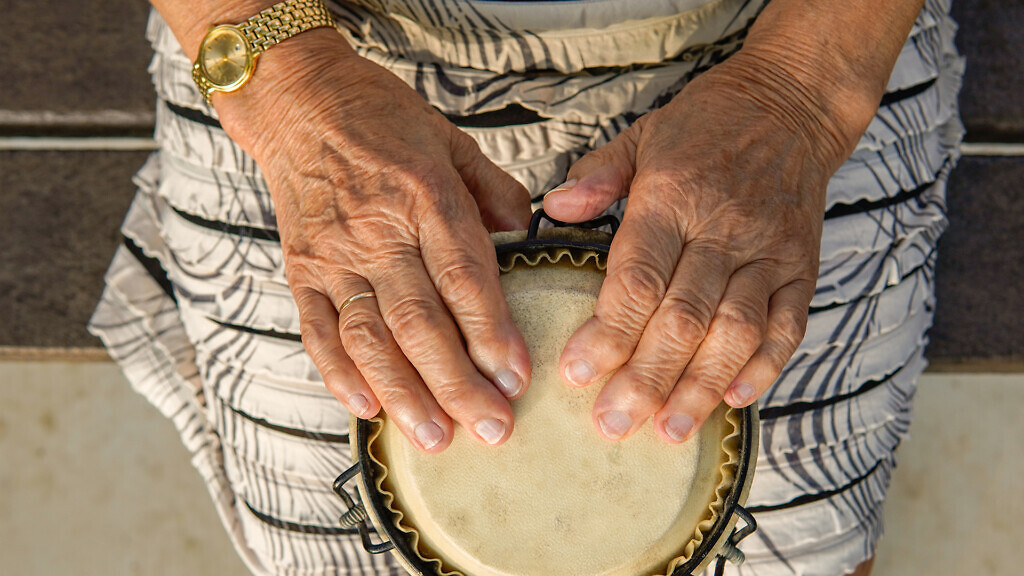Emma Hewat, Director of Dementia Care at care home company KYN, writes that regular engagement with music can help maintain and even improve cognitive abilities in older adults.
One person’s experience of dementia is as individual and unique as they are. While a diagnosis of dementia can mean a greater need for care, the focus has to be on supporting the emotional well-being of residents; helping them to maintain their identity and dignity; and enabling a continued engagement with their family.
We do this by offering choice, respect, minimising medicinal intervention, and placing an emphasis on research-led care. We provide our residents living with dementia with calm, enriching environments, in areas designed specifically for their needs with dedicated social spaces, outside terraces, and sensory gardens.
While there are many ways that caregivers can help to enrich the quality of life of those living with dementia, music especially has long been celebrated as a powerful tool for transforming lives, for those affected by the condition as well as those enjoying a regular, everyday life – we all know what it’s like when you’re having a bad day, and your favourite song comes on the radio. The power to change your mood with music is without a doubt transformative.
The benefits of music for older adults are wide-ranging and well-researched, with studies showing that listening to familiar music and participating in group singing lessons can lift spirits and alleviate feelings of depression. Regular engagement with music can help maintain and even improve cognitive abilities in older adults, including those with only mild cognitive impairment. Music has also been shown to decrease anxiety and stress levels (in older adults particularly), helping them to feel more at ease in their environment. This could probably be said for many children, too!
On top of this, group music sessions provide wonderful social opportunities for meaningful connections and engagement, helping to combat feelings of loneliness and isolation, as well as offering an alternative means of communication, creativity, and connection, for those with speech difficulties or impairments. Rhythmic music can also inspire movement and improve coordination, potentially reducing the risk of falls and allowing for some physical activity and freedom.

A sense of self
From an emotional point of view, music can also reinforce a sense of self for those living with dementia, with familiar songs triggering memories and emotions. This can assist individuals with reconnecting to their past, strengthening their sense of self, identity and place in the new world in which they find themselves.
Whether through listening, singing, playing instruments, or composing, musical activities can be tailored to meet the individual needs and preferences of each person. In the context of older adult care, music can take various forms, including but not limited to music therapy sessions led by qualified professionals, group singing or instrumental activities, live concerts and performances, one-to-one music enjoyment with carers or musical practitioners and the creation of tailored playlists.
For people living with dementia, music has the power to reach parts of the brain that remain relatively unaffected by the disease, allowing them to connect with memories and emotions that may otherwise be difficult to access. This is why it is such an important part of dementia care, helping to soothe, calm, stimulate, and preserve, and potentially reduce behavioural and psychological symptoms.
Our teams work with organisations such as Songhaven and Live Music Now to integrate music into the daily lives of our residents, creating personalised programmes that honour each individual’s unique musical preferences and needs. This includes musician residencies, live music concerts, interactive music sessions, and one-to-one music enjoyment.

The positive impact of music
In April, we recruited a musical care practitioner for our KYN Bickley home. This multi-instrumentalist professional musician joined the team to bring music to residents in both planned and spontaneous ways throughout the week. Musical care is an approach to integrating music into the day-to-day living and caring experience.
Moving from the starting point of being fun and enjoyable into the opportunity for a range of music activities (listening, participation, making, expression) that support and impact positively on the well-being and health of the residents and advance the quality of care. Greater access to music positively impacts residents’ ability to communicate their personality, express their preferences and take agency.
We all have an individual relationship with music, whether or not we are trained musicians. It is used as a means by which we formulate and express our individual identities and present ourselves to others in the way we prefer. It is shaped through exposure to lifelong musical experiences and encounters, relationships, memories and heritage. Our musical tastes and preferences can form an important statement of our values and attitudes. A key element of the musical care practitioner’s role is ensuring that music activities are personalised, person-centred, meaningful, inclusive and accessible and respond to, reflect and value the identities and contributions of all taking part
The starting point for any musical interaction is looking for what people can still do. The musical care practitioner builds on this by looking for ways people can achieve, progress and be creative despite the realities of living with a condition which leads to a decline in function. This role focuses on the progressive and creative expressive experience during the dementia journey reinforcing the idea that dementia is not just an experience of decline. Already we are noticing small changes in our residents.
The transformative power of music can create more joyful, engaging, and fulfilling experiences for older adults in care.



